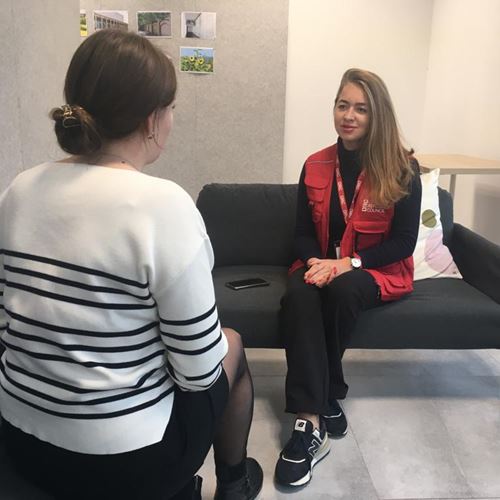We meet Antonina (26 years old) at the Rzeszow Protection Hub (ProHub). It could feel as being one of her clients as we sit in her cozy office. She leans confidently, ready to tell her story while her child is playing around with other kids attending Child Friendly Space at the ProHub. Antonina is hired by a local legal aid organization and provides free-of-charge legal counselling to refugees at ProHub. She supports refugees on issues related to temporary protection in Poland as well as Ukrainian legal system. These include for example restoration and exchange of documents, accessing health and employment records, bank accounts, pension and other social assistance, issues with rental contracts and evictions from apartments.
For her being employed at the ProHub is a way to support those with a similar situation to her, but she and her family also benefit from the services the Hub offers: cultural excursions, manual art workshops, Polish and English language classes or just an informal meeting with her fellow Ukrainians.
A sudden “holiday”
Antonina lived with her family in Kherson, South-Eastern Ukraine, in a newly bought and long-awaited apartment. She was also about to start her first job as a lawyer after prolonged maternity leave and finding a place for her daughter in a kindergarten. Everything seemed to be getting an exciting new perspective when on 24th February 2022 her husband started receiving multiple calls and notifications. First, information about Russian forces entering the city came. After, the news of the nearby airport no longer existing arrived. The sounds of the explosions started to get closer and closer. With only a few belongings – mostly clothes for her child and a few documents in a bag, Antonina explained to her little daughter that they were going on a surprise holiday, she could not tell her the place of destination yet.
Never, in her imagination, Antonina had envisioned that she should be forced to pack a few belongings, travel through frontlines, and endure hours of interrogation by foreign soldiers from the neighbouring Russian Federation. They travelled until they reached Dnipro in Easter Ukraine, where Antonina’s parents lived.
Back then and now, the village of the parents stays under Russian occupation. Antonina and her family spent three months there – with little sleep, attempting multiple times to flee, and eventually spending days and nights without heating. With no clear destination plan for their next step or any other place to stay, they took up an almost equally dangerous 180km harrowing journey back to Kherson, passing through 31 checkpoints. All they knew was that they had to collect additional belongings and stay safe.
A harrowing journey
From this moment Antonina starts becoming nervous and her words in perfect Polish stutter. The way out of home was one of the most degrading experiences of her life.
“No matter if you were an adult or a child, on the border check point they demanded us to undress till underwear. They questioned everything they could find at you: tattoos, items, contact lists, photos on your social media. It all lasted six hours, the longest six hours of being treated with no respect” - explains Antonina. Similar process took place while entering Estonia. In contrast with the way there were treated before, the crossing of this second border was described by Antonina with emotions that are a mix of relief, gratitude, despair, and sadness: “It was a huge relief. Suddenly we were treated again as human beings. The sensation of freedom was a rather unique experience”.
Holiday destination revealed
Looking around for safety and security, Antonina’s family decided to go to Wroclaw as their temporary destination. They all thought it would be providing a home for the next two or three months and after that, they would have returned home.
The feelings surrounding this time were not typical “holiday” feelings and emotions. At the beginning a sense of shame and pity caught them. Then came the sensation of being a stranger, with no one to know and with little means to cope. Helped by private citizens and initiatives offering transport and support, the family moved to Rzeszów.
Safety – and time to reflect
“We are grateful for being safe, but we can only think about today and perhaps tomorrow. It is impossible to plan for anything as it is, and we must accept that. We also need to move forward; we can’t live just for the perspective of returning one day. The life needs to go on” - says Antonina.
Looking around for more opportunities to be socially integrated, Antonina is considering taking cooking classes in Rzeszow, and one day open her bakery shop. Although Poland has become her second home as she feels comfortable and confident here her wellbeing is influenced by the uncertainty and trauma that is now a condition of life that she shares with millions of Ukrainians impacted and displaced by the ongoing war.
*Names are changed to protect identities
DRC activities in Poland since the Ukraine displacement crisis are funded by UNHCR.
